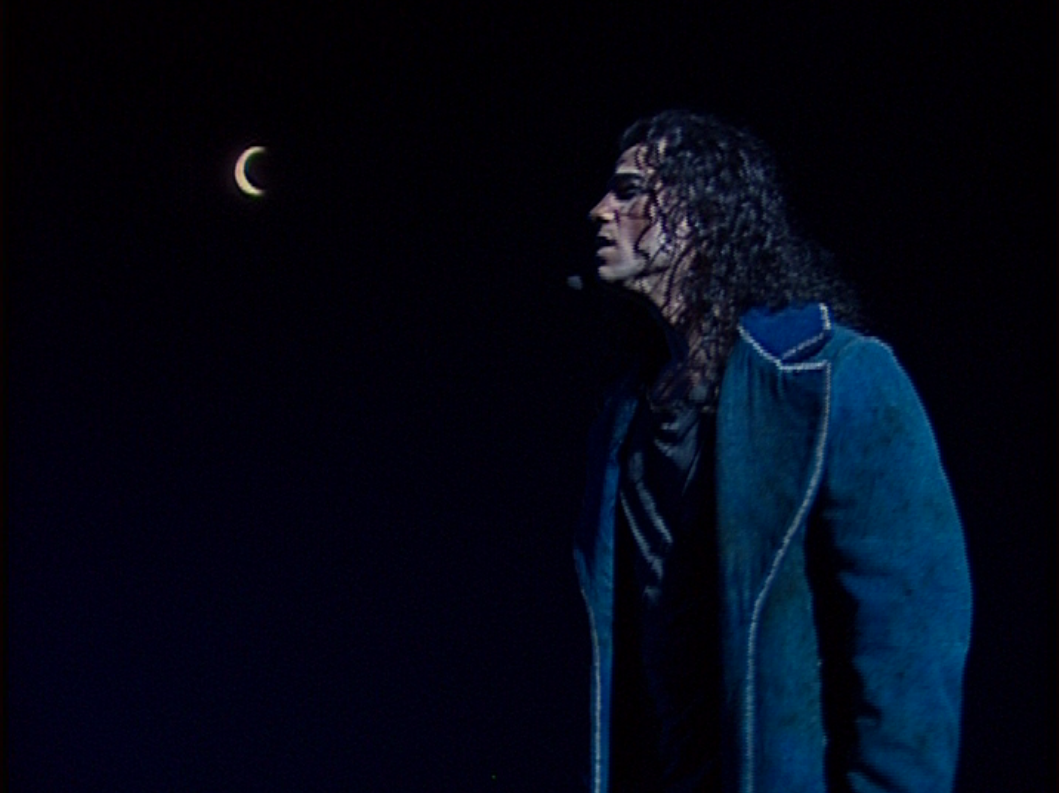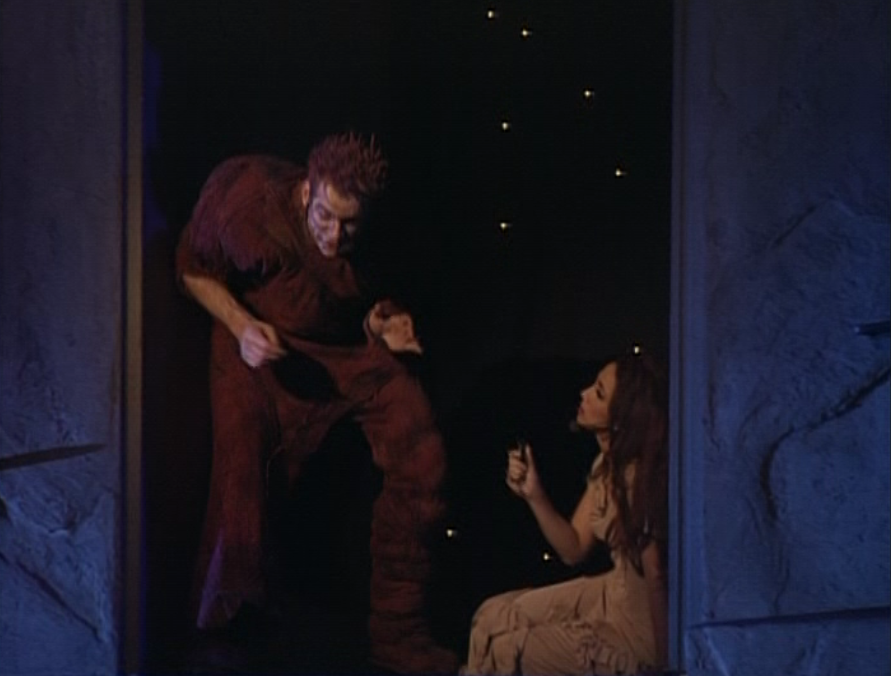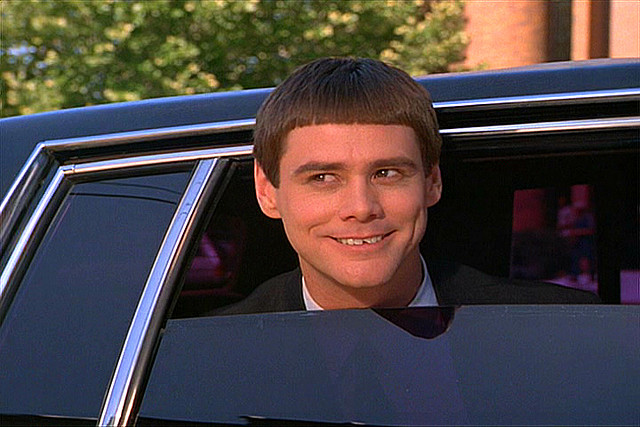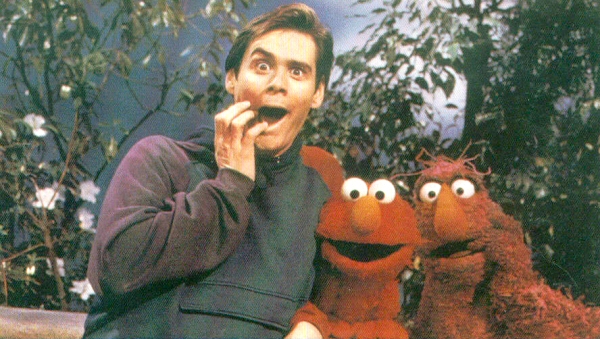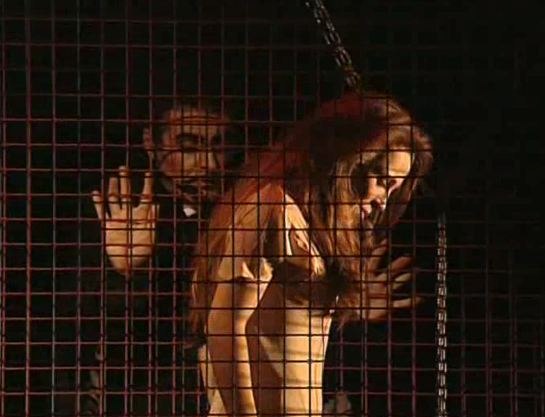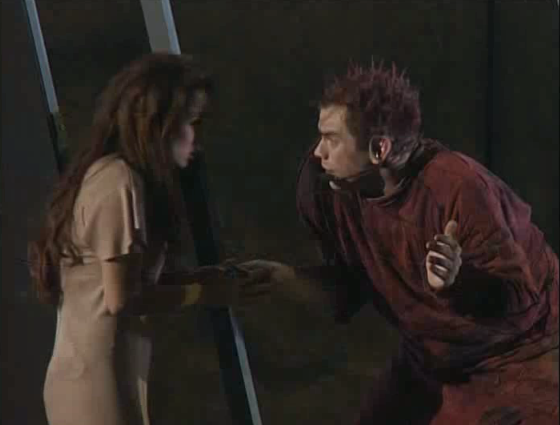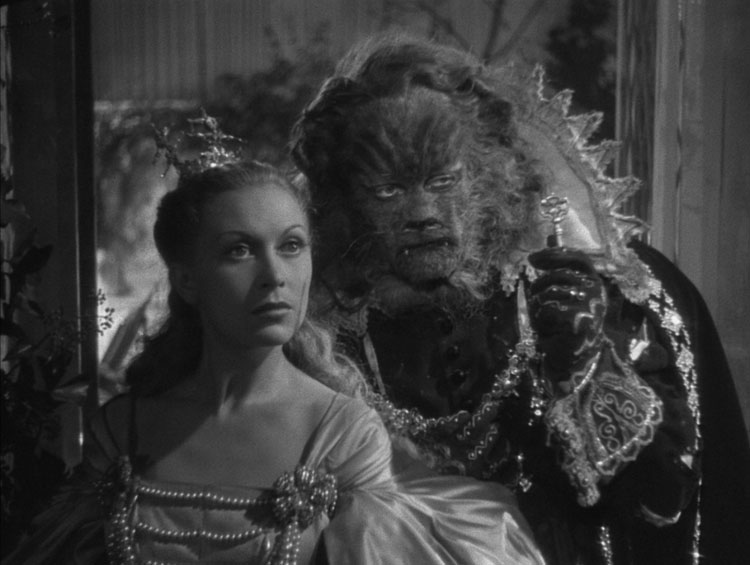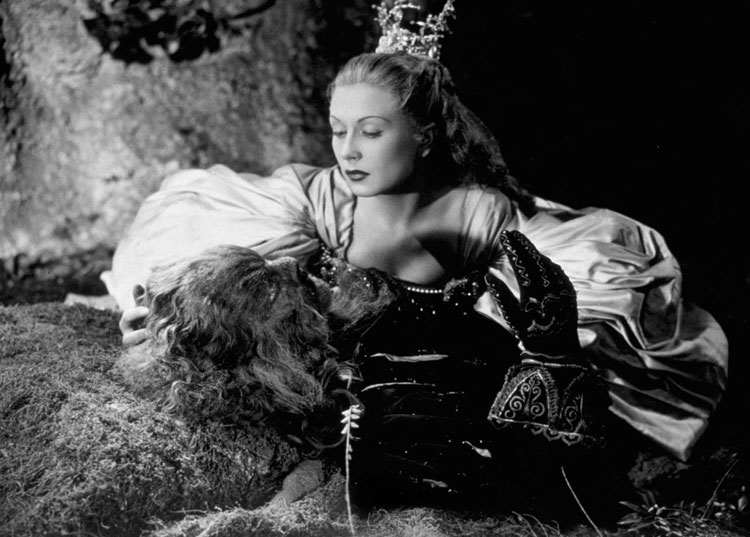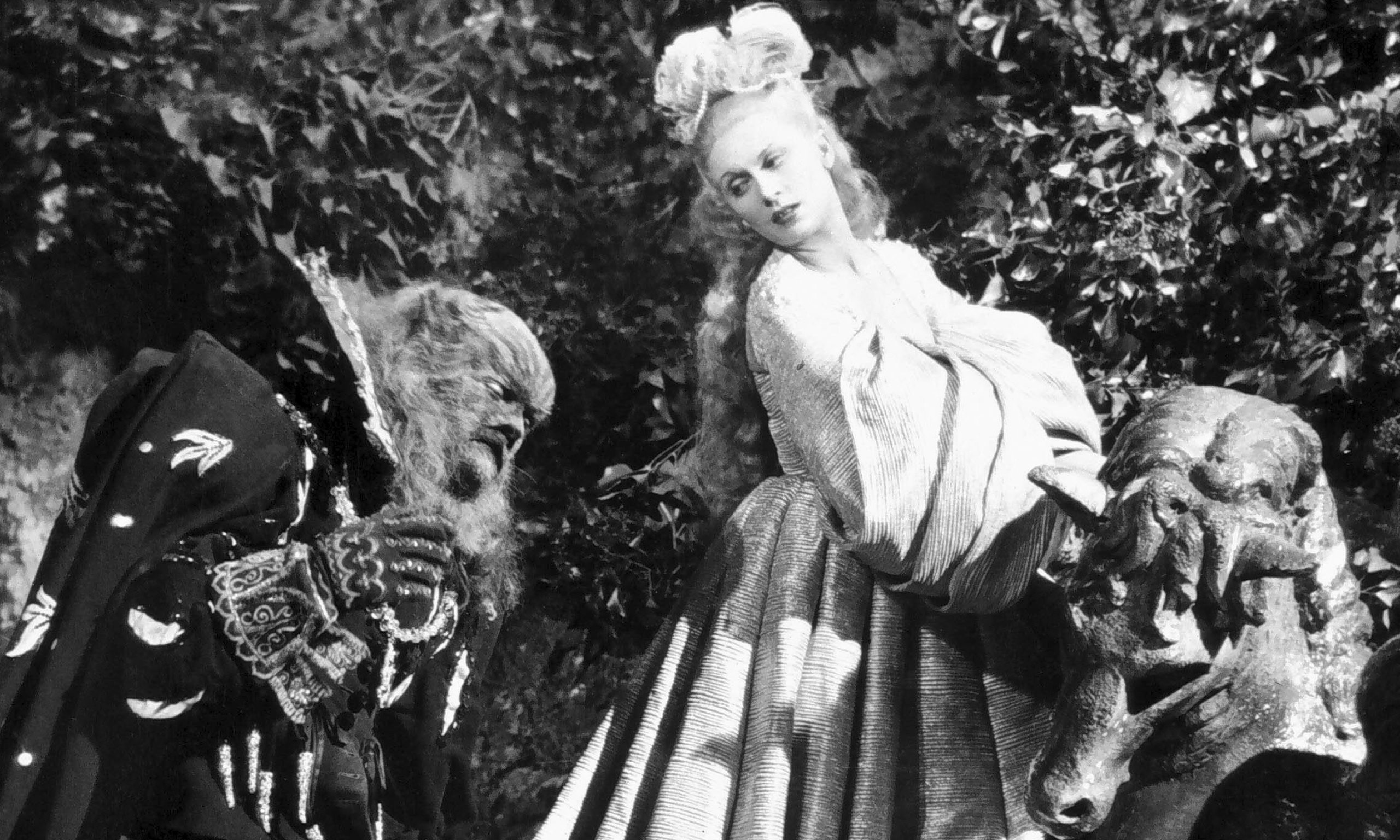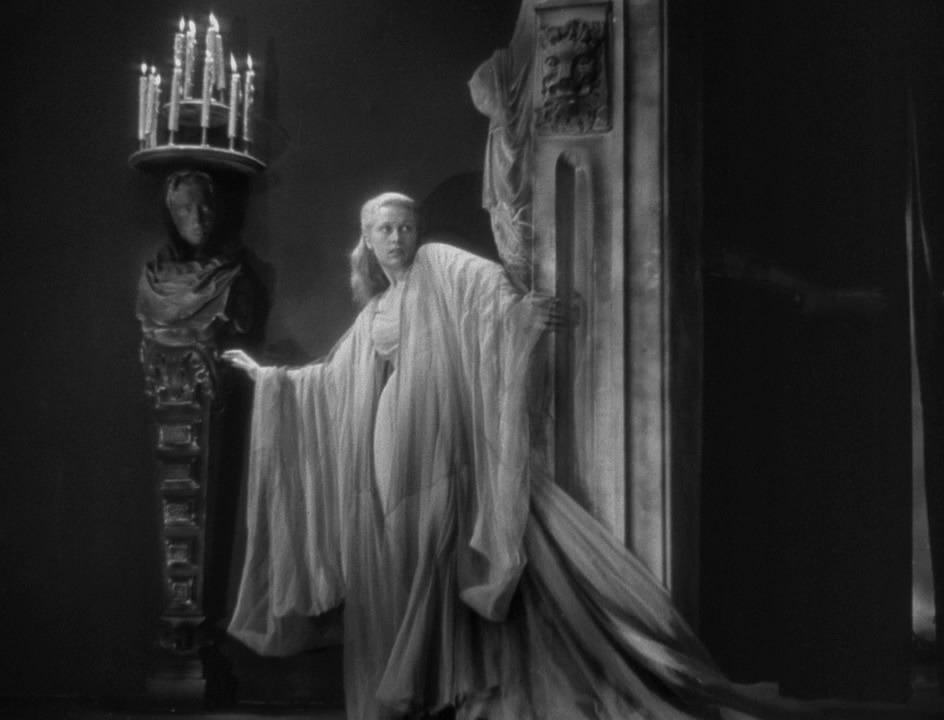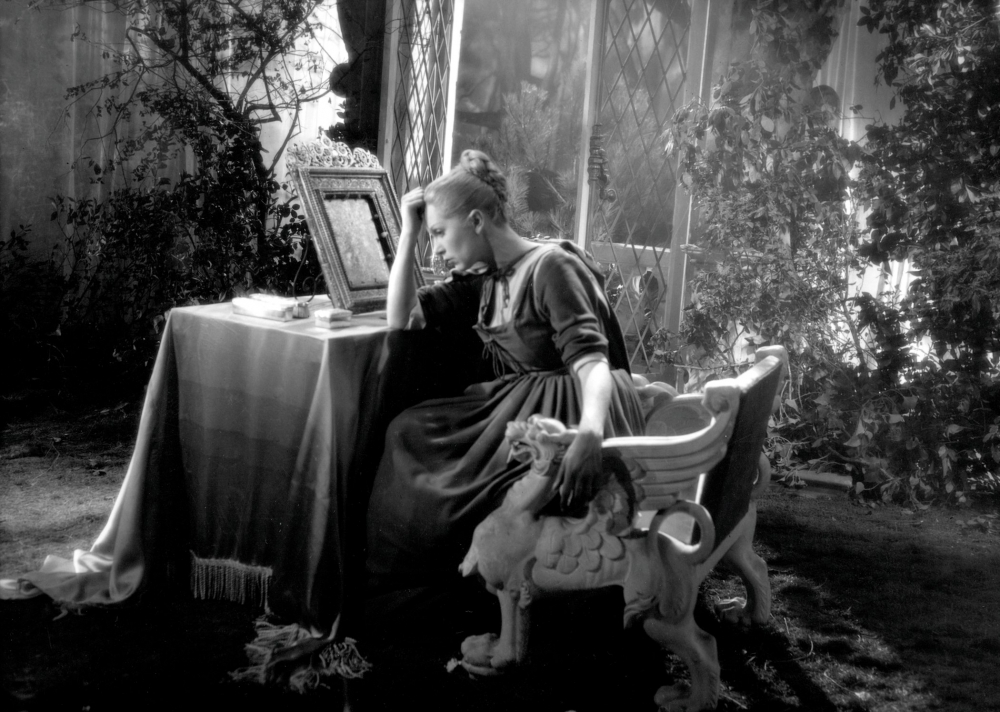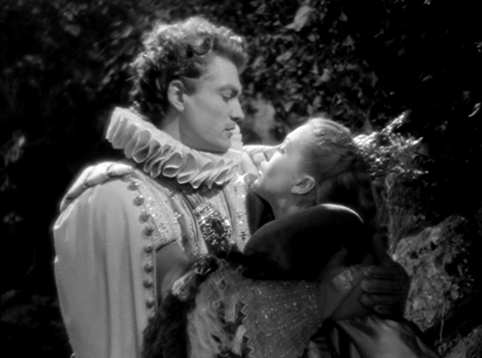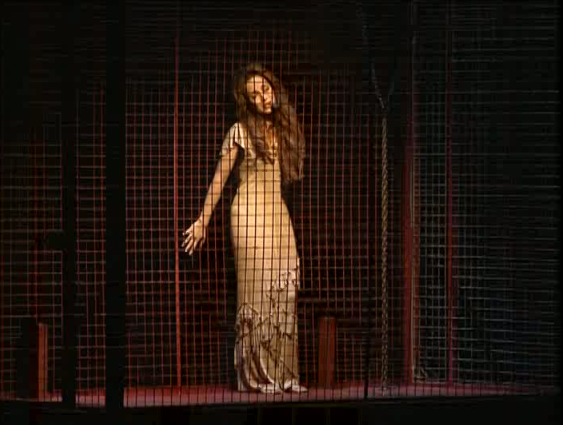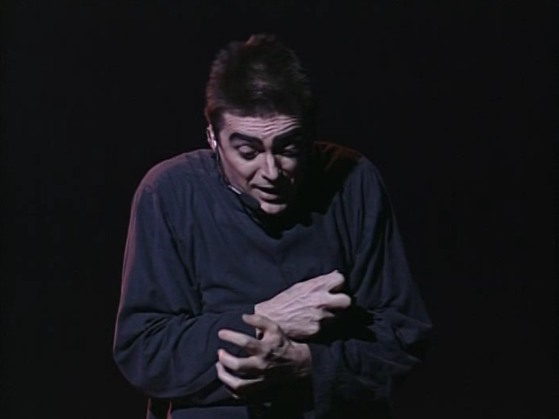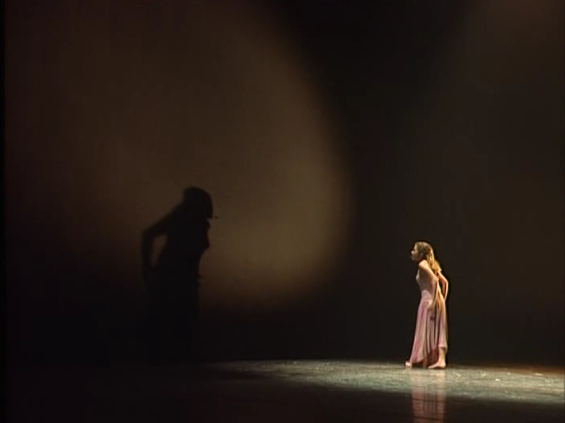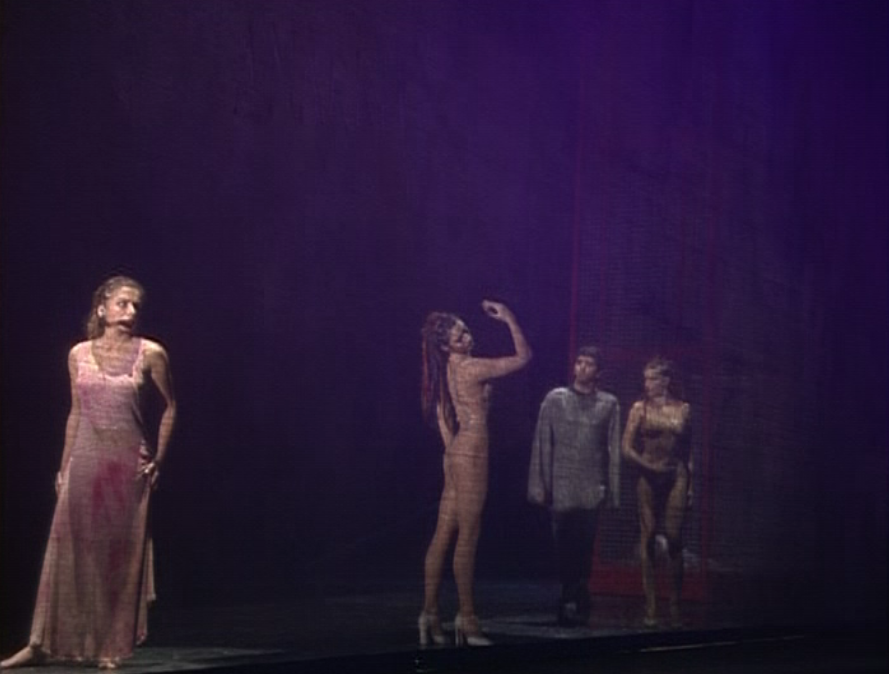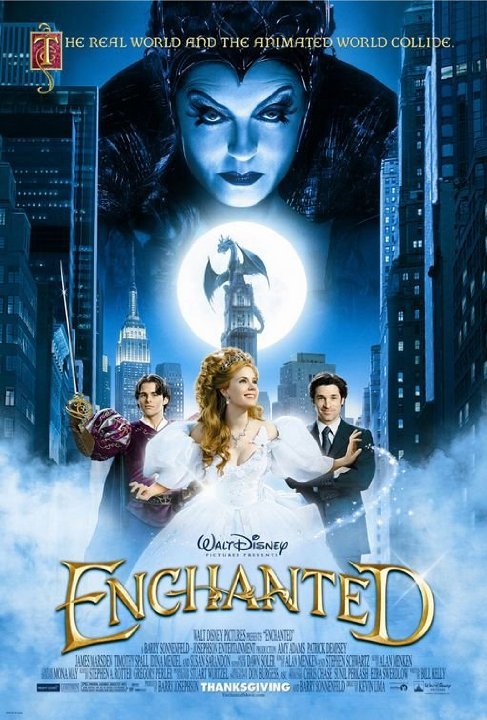
Enchanted
The first time I ever saw the 2007 movie Enchanted, I was on a plane going from Quebec City to Montreal. I’m not sure why they offered in-flight entertainment for a thirty minute flight but I watched like ten or so minutes and I enjoyed it enough to rent it when I got home, ahh the days of rental places. Enchanted is an entertaining enough movie yes but does its message of real life vs fantasy get muddle in Disney-ideals and its own tropes? Let’s find out but the answer is yes.
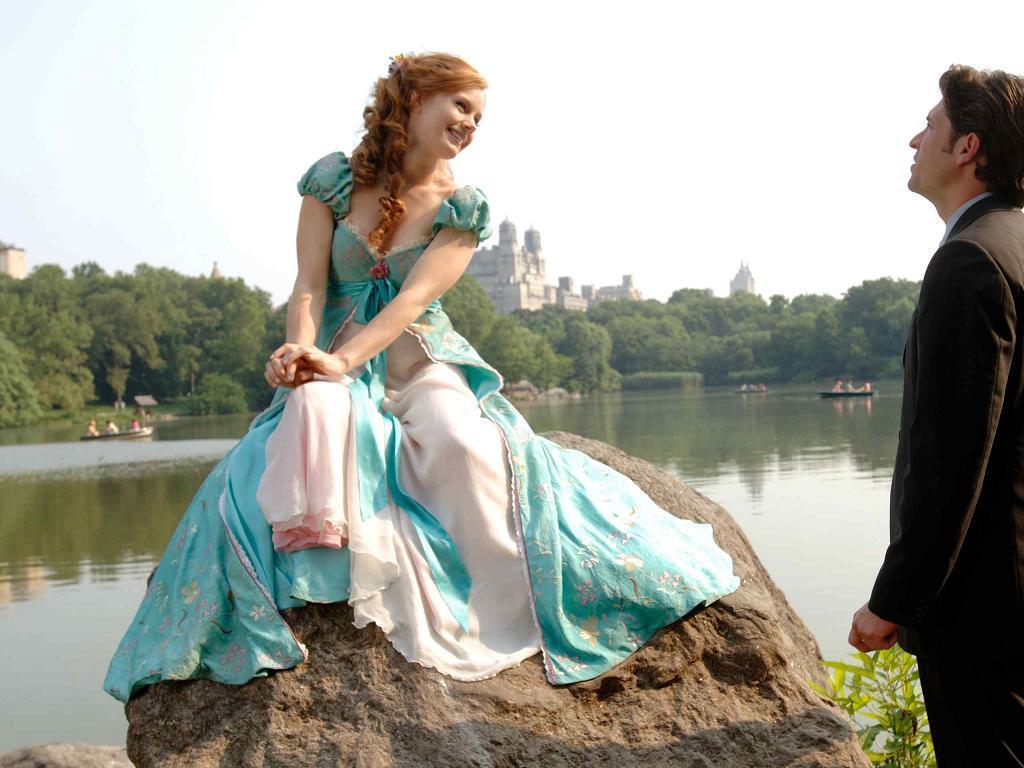
Amy Adams as Giselle with Patrick Dempsey as Robert
Fair Maiden Giselle, one day meets Prince Edward and they promptly decide to get married the next day, why rush a good thing, right? However Edward’s stepmother Queen Narissa doesn’t want Edward to get married as it would diminish her power so on the wedding dat Narissa pushes Giselle down a fountian waterfall spring thing to a place where happy ever after don’t exist, Manhattan, and not like third world country no, fucking Time Square is where happy ever after don’t exist, like that’s the joke?
Anyway Giselle has a rude awaking but meets Robert and Morgan, father and daughter. Robert doesn’t want Morgan to idealize Princesses and Morgan does. Robert feels this way because Morgan’s mom left for reason. They take Giselle back to their apartment which causes a little fiction with Robert’s girlfriend Nancy. Giselle uses her fairy-Princess super powers to help people with love but Robert teaches Giselle about dating and forming attachments through getting to know a person.
While that is happing Narissa’s henchman, Nathaniel is trying to kill Giselle by poison apple method, Giselle’s chipmunk pal, Pip is trying to help Giselle not to die and Edward is searching for Giselle. Then when Nathaniel fails and Edward finds Giselle, Narissa comes into the fray as she had been previously communicating with Nathaniel through water.
So they all go to a ball where Giselle dons a modern gown. Giselle and Robert dance but then Narissa has Giselle eat a poison apple, Edward’s kiss fails to break the spell but Robert’s does and Nancy and Edward are okay with that. Narissa however turns into a dragon to kill everyone and drags Robert and Giselle up to the roof where Giselle slays her pretty darn easily. So Nancy and Edward go back to the fairy-tale world and get married, Nathaniel and Pip write tell-all-books and Giselle starts a fashion-line because she was good at sewing and I guess her and Robert get married maybe and she become a nice stepmother. Subversive!
Okay before I get into this movie I HAVE to say, with a Queen Stepmother trying to gain control by killing her step-son’s love (who happens to be dealing with a world that is not her own) to maintain her power and she uses water magic, this reminds of a a manga I like, it was almost distracting.
I like, it was almost distracting.
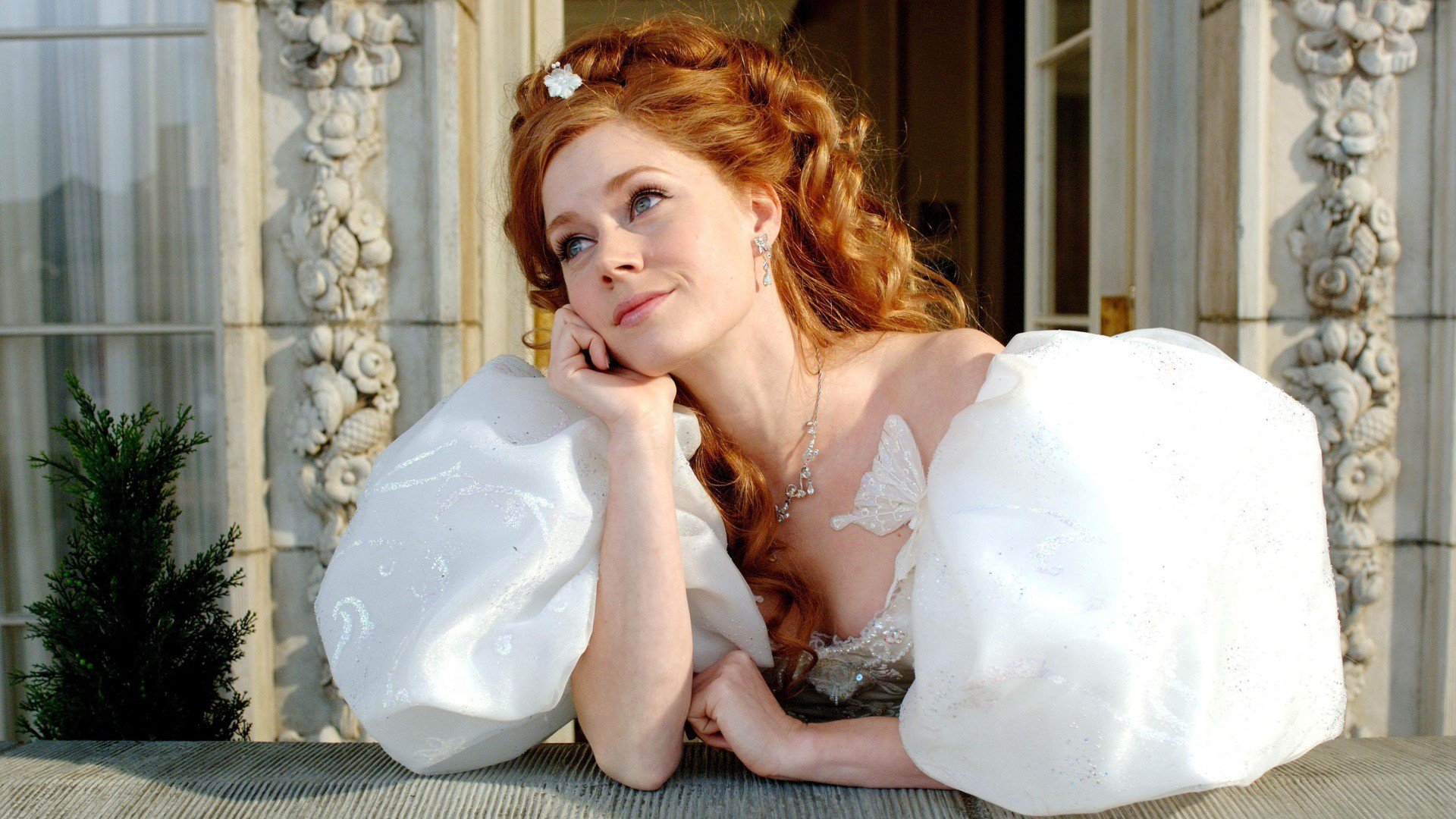
Amy Adams as Giselle
Enchanted does some nice things with subverting the Disney tropes however it undermines itself too. First off, yes, Giselle doesn’t just marry her “true love” she gets to know him and the true love thing is grown and somewhat cultivated in a way. Giselle is given more self-awareness however I doubt that Giselle would ever have a problem with Edward as the fairy-tale world or Andalasia as in it’s very existent is being ignorant of problems unless you’re a bad guy. So Giselle is the positive but as other side of that coin is Nancy.
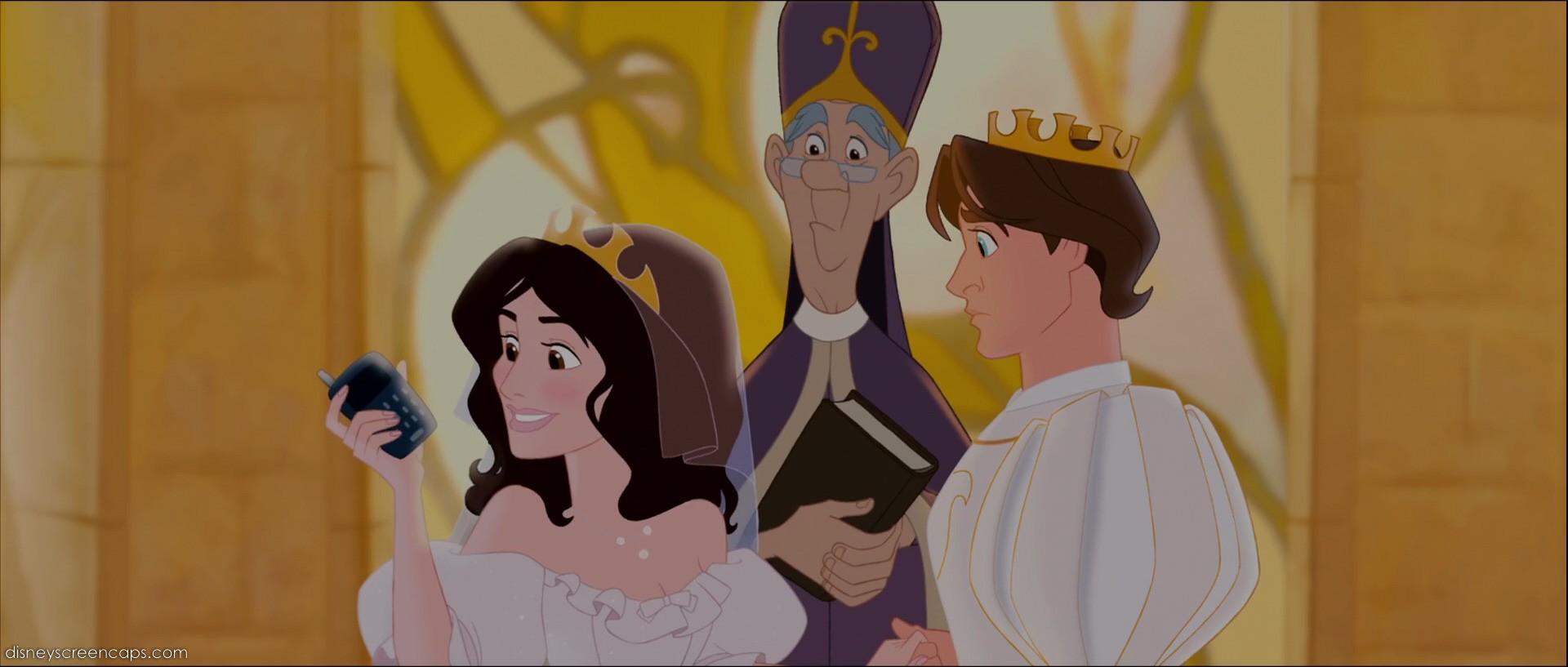
Nancy Tremaine (voice by Idina Menzel) and Prince Edward (voiced by James Marsden) getting married in Andalasia
Nancy just throws a whole wretch into what the movie was trying to say, life isn’t like a fairy-tale except if you drop everything in your life and run off with a guy you haven’t know for a day and marry him. Seriously, Nancy and Edward get married at the end? Why? Because the screenwriters wanted them to have a happy ending after being dumped? Are we REALLY to believe a woman, who seems like she has a pretty good life would run off with some guy she JUST met and exchange maybe like handful of sentence? Sure, we didn’t REALLY get to know Nancy all that well but she didn’t seem the type who would abandon everything for some guy who spoke somewhat romantically and she REALLY didn’t seem too broken up about Robert leaving her away.
The screenwriters kinda wrote themselves into a corner because either Nancy had to be the fairy-tale princess and leave her world behind or Edward would have needed to stay in New York City which means, Edward would have needed an arc which he did not get. If the movie wasn’t so entertaining this would be a bigger issue since the movie wanted to parody this kind of thing and work against it but it’s ok for side characters to marry people they don’t know, just not the main characters.
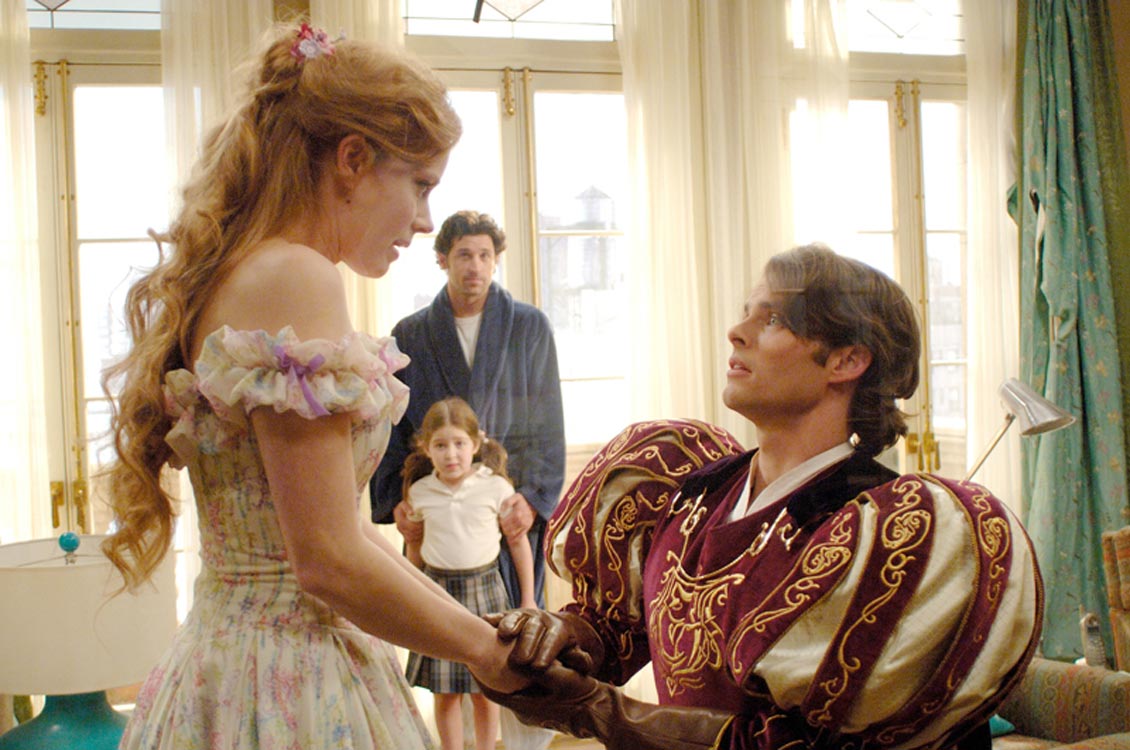
Amy Adams as Giselle with James Marsden as Prince Edward and with Patrick Dempsey as Robert and Rachel Covey as Morgan
Aside form that the movie is really well done. The acting is really good and everyone seems like they are having fun with their roles. I do think Susan Sarandon as Narissa is miscast but she is not that bad. I really enjoy James Marsden as Edward but I’m an unabashed 30 Rock fan so anything that reminds me of that is a-ok. And Amy Adams lives the role of Giselle, she was pretty perfect.
fan so anything that reminds me of that is a-ok. And Amy Adams lives the role of Giselle, she was pretty perfect.
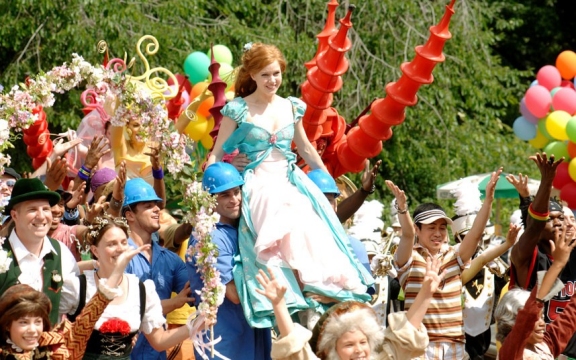
Amy Adams as Giselle performing That’s How you Know
The technicals in this movie were fun too. The animation is fluid and clean and it wasn’t done by Disney how is that for the ultimate irony. The live-action parts are nicely shot and have a fun and playfulness.
I have to love the costumes except for one, the one that disappointed me down to my very soul, that Tahari gown Giselle wore at the ball. I don’t know why films do this, but if there is a costume ball the main characters will ignore it and wear a regular dress. They did it in the 2004 Phantom of Opera and I will NEVER forgive them. I mean the dress is pretty, it is just number one, it’s too simple for the venue, if they had a more Oscar style evening gown, something with a wow-factor I could see it. And number two this dress is like going from zero to 360 for Giselle. I guess the point of Giselle’s costumes is that they get more modern the longer she is in the real work but come on movie, that Tahari gown was in no way the next step for her fashion evolution. I say no. Otherwise the costumes were great.
The musical numbers are a lot of fun. The big number, “That’s how you know” is bright and colorful and big. It reminds me of the pretty women number in Kal ho naa ho which is fun number.
which is fun number.
I think the only number that wasn’t that great was the Ballroom dance, though maybe I just don’t like that scene, that darn dress and the final fight meh. Also why didn’t Narissa get a a villain songs, seriously we get three freaking songs about love and romance but no Villain songs. (is it just me or did Giselle understand dating more than Robert with all the things she listed in That’s How you know?)
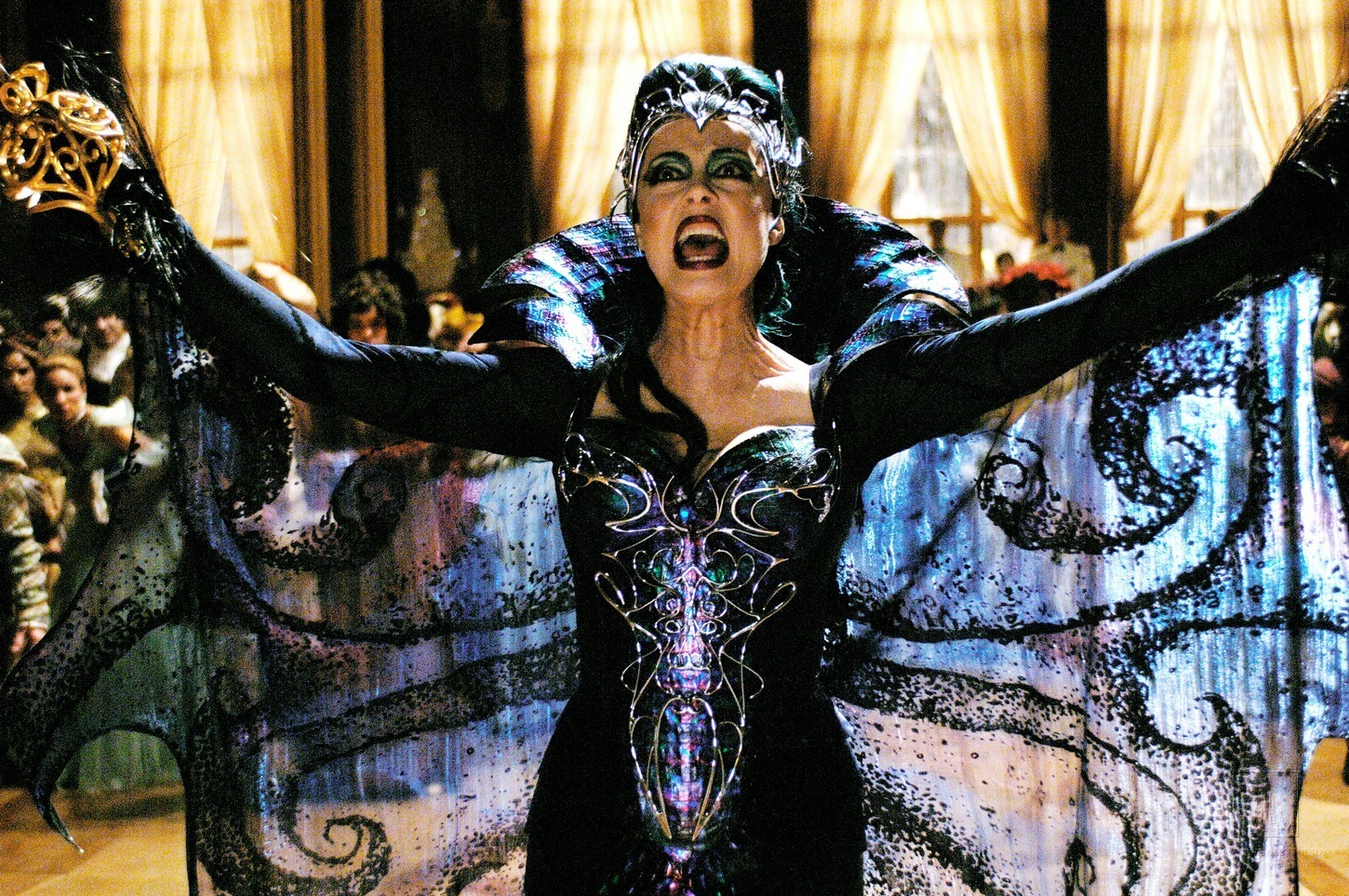
Susan Sarandon as Queen Narissa
Okay, speaking of Narissa, what was her plan and how did the whole power thing work? First off, problem one, her motivation was to keep the prince single so she could remain queen? So why didn’t she just kill the prince instead of going after his bride? It’s just a stall. Then her motivation changes to just being evil because even though at that point it was established that Giselle wasn’t into Edward, so why did she bother and she was one weak fucking dragon. I would THINK it would take more than a sword wound to prevent her from flying and I dunno, burning people? I think they were referencing Sleeping Beauty but they fairies gave the prince buffs to his sword or whatever.
Second, how does succession work in Andalasia? Does the Queen maintain her power after the king is dead? But then why is Edward a prince and Narissa a queen? Shouldn’t Edward be King? Do you have to be married in Andalasia to get a King/Queen title? Is Edward’s father still alive? Why don’t Disney villain ever just try to manipulate the royals instead of being the ruler? Like Narissa could have wrapped Giselle around her figure and been a shadow ruler. What kind of power did Narissa hold anyway? Did she share it with Edward? Or what she acting regent till he married? Then why didn’t she kill him and pull a coup? How does is work??? It’s not important to the story but it’s the villain’s motivation, I dunno maybe a song could have cleared it up, or she could have been a better evil villain to make me forget this kind of stuff, she is as menacing as tin foil. Also her costume looked more sci-fi than fantasy, more leading a legion of spiders than queen of place called Andalasia.
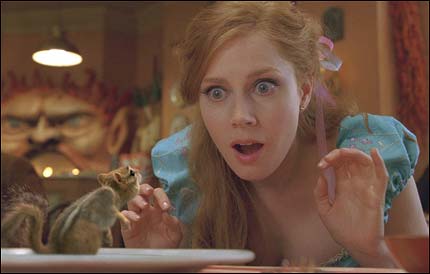
Amy Adams as Giselle with Pip
Despite its flaws, and boy does it have them, Enchanted is a fun and entertaining movie that does a nice job of parodying and paying homage to Disney tropes all while totally buying into them.
is a fun and entertaining movie that does a nice job of parodying and paying homage to Disney tropes all while totally buying into them.
Time for Clues, Clue 1 & Clue 2
& Clue 2
One of those clues makes me laugh, try and guess which one and the next movie.
is a gorgeous song. If you don’t believe that a Gringoire performer can sing then this knocks it out the park.

